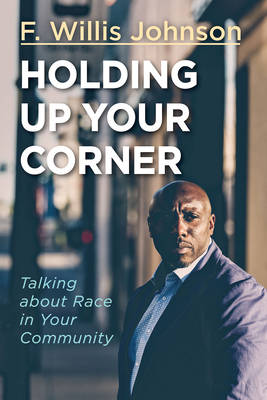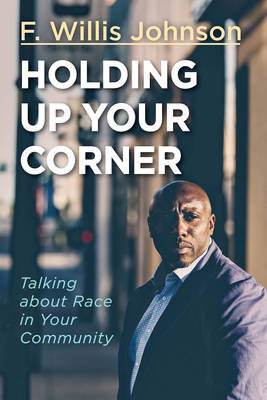
Je cadeautjes zeker op tijd in huis hebben voor de feestdagen? Kom langs in onze winkels en vind het perfecte geschenk!
- Afhalen na 1 uur in een winkel met voorraad
- Gratis thuislevering in België vanaf € 30
- Ruim aanbod met 7 miljoen producten
Je cadeautjes zeker op tijd in huis hebben voor de feestdagen? Kom langs in onze winkels en vind het perfecte geschenk!
- Afhalen na 1 uur in een winkel met voorraad
- Gratis thuislevering in België vanaf € 30
- Ruim aanbod met 7 miljoen producten
Zoeken
€ 22,45
+ 44 punten
Omschrijving
Holding Up Your Corner: Talking About Race in Your Community, equips pastors to respond with confidence when crises occur, lower their own inhibitions about addressing this topic, and reclaim their authority as prophetic witnesses and leaders in order to transform their communities. Pastors and other church leaders see, to varying degrees, racially rooted injustice in their communities. Most of them understand an imperative, as part of their calling from God, to lead their congregations to address and reverse this injustice. For instance, preachers want to be preaching prophetically on this topic. But the problems seem irreversible, intractable, overwhelming, and pastors often feel their individual efforts will be futile. Additionally, they realize that there is a lot of risk involved, including the possibility that their actions may offend and even push some members away from the church. They do not know what to do or how to begin. And so, even during times of crisis, pastors and other church leaders typically do less than they know they could and should. This book provides practical, foundational guidance, showing pastors how to live into their calling to address injustice, and how to lead others to do the same. Holding Up Your Corner prompts readers to observe, identify and name the complex causes of violence and hatred in the reader's particular community, including racial prejudice, entrenched poverty and exploitation, segregation, the loss of local education and employment, the ravages of addiction, and so on. The book walks the church leader through a self-directed process of determining what role to play in the leader's particular location. Readers will learn to use testimony and other narrative devices, proclamation, guided group conversations, and other tactics in order to achieve the following: Open eyes to the realities in the reader's community--where God's reign/kingdom is not yet overcoming selfishness, injustice, inequality, or the forces of evil. Own the calling and responsibility we have as Christians, and learn how to advocate hope for God's kingdom in the reader's community. Organize interventions and activate mission teams to address the specific injustices in the reader's community. What Does 'Holding Up Your Corner' Mean? The phrase 'holding up your corner' is derived from a biblical story (Mark 2: 1 - 5) about four people who take action in order to help another person--literally delivering that person to Christ. For us, 'holding up your corner' has meaning in two aspects of our lives today: First, it refers to our physical and social locations, the places where we live and work, and the communities of which we're a part. These are the places where our assumptions, attitudes, and beliefs have influence on the people around us. When we feel empowered to speak out about the injustice or inequity in our community, we are holding up our corner. Second, the phrase refers to our actions, the ways we step up to meet a particular problem of injustice or inequity, and proactively do something about it. When we put ourselves--literally--next to persons who are suffering, and enter into their situation in order to bring hope and healing to the person and the situation, we are holding up our corner, just like the four people who held up the corner of the hurting man's mat. Holding Up Your Corner is a passionate, fast-paced, wonderfully practical book. F. Willis Johnson has a gift for Christian communication and he pours all of his gifts and rich pastoral experience into a book that encourages his fellow Christians to acknowledge, affirm, and act in the face of the racism that grips many of us. He displays deliberative theology in the service of instigating talk and action on behalf of racial justice, all in the service of a God who graciously enlists us to work with God to defeat evil. I guarantee that after reading Willis Johnson you will want to work from your corner to become part of God's work in the world." --Will Willimon, UM Bishop, retired, Professor of the Practice of Christian Ministry, Duke Divinity School
Specificaties
Betrokkenen
- Auteur(s):
- Uitgeverij:
Inhoud
- Aantal bladzijden:
- 144
- Taal:
- Engels
Eigenschappen
- Productcode (EAN):
- 9781501837593
- Verschijningsdatum:
- 3/01/2017
- Uitvoering:
- Paperback
- Formaat:
- Trade paperback (VS)
- Afmetingen:
- 152 mm x 226 mm
- Gewicht:
- 204 g

Alleen bij Standaard Boekhandel
+ 44 punten op je klantenkaart van Standaard Boekhandel
Beoordelingen
We publiceren alleen reviews die voldoen aan de voorwaarden voor reviews. Bekijk onze voorwaarden voor reviews.









